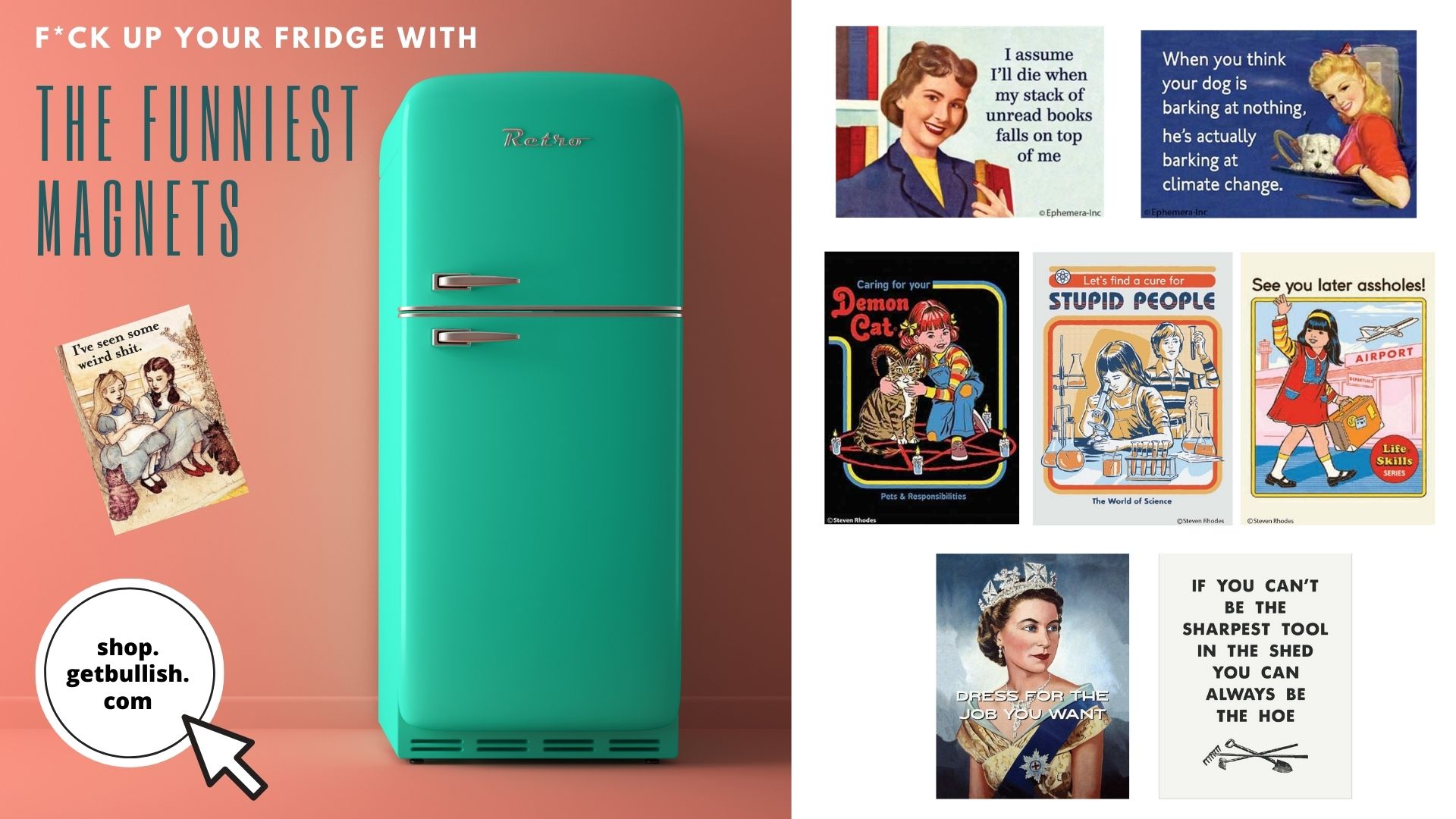This article is more than ten years old. It originally ran on a now-defunct website called The Gloss, where Bullish got its start. This post was created entirely by humans, as AI didn’t exist back then (but also: why would you want to read something no one could be bothered to write?) For more recent posts, try here.
I once went on a two-week hiking/camping trip over a stretch of the Appalachian Trail. I did not train for this trip. I did, however, make numerous trips to Asian grocery stores to buy dehydrated everything (vegetarian squid made out of yam flour, with tentacle-suckers painted on!), enough to feed three people for several days.
The first night out, I made sushi rice with seaweed and sesame seeds over an open fire. It was fun! Then I slept in a sleeping bag on top of a bunch of rocks and roots. Fuck you, roots!
Then we got up, ate peanut butter on crackers, and started walking uphill. It would be hours of this before I got to make shirataki noodle soup with wakame and freeze-dried shrimp. I despise walking uphill! Also, seeing a bunch of treetops from the top of a mountain is not nearly as exciting as they tell you it’s going to be, even if there’s a sunset. The sunset just means that soon you’ll be freezing your ass off on the top of a mountain.
I bailed for the nearest town and hiked to a bus station, leaving behind the groceries (and a world of pain!)
At some point in life, you have to decide whether being able to survive in the wilderness — or a postapocalyptic world — is important to you. If so, you might move to Montana and get a ranch, which you defend with guns, which you obviously know how to shoot. Once you know how to defend yourself with a gun, well, wouldn’t it be ironic if you needed a gun and weren’t carrying one? So then you start packing. At this point, you’re really not going to get a job at Goldman Sachs. You have to make some decisions.
At the other extreme, you have your stereotypical effete New Yorker who has no food in her house and cannot function without a cell phone, the Internet, credit cards, takeout, and a concierge. (She complains that the flooding has ruined her blowout! When she tries to volunteer for a relief effort, she is told that her social media management skills are not needed! Ha ha ha. I exaggerate, of course.)
You can try to play the middle. I am led to believe that a lot of tech people in San Francisco and Colorado do outdoorsy stuff on the weekends (whitewater rafting is an excellent way to escape a terrorist attack). Men who become very, very rich through their business exploits do seem to turn to extreme outdoor sports nearly as often as they turn to, say, cars and classic cocktails as hobbies. (Richard Branson types: either they’re getting hot-stone massages on a boat while drinking sake, or they’ve grown shrub-like beards and are pressuring local guides to climb much further up Kilimanjaro than it is really safe to under current weather conditions.)
If you grew up on a farm and then moved to the big city and mastered all the social and professional conventions, you may have the best of both worlds.
I read Neil Strauss’s Emergency: This Book Will Save Your Life. (Book blurb: “As the economic downturn, continuing climate change and the prevailing terrorist threat prove that the dangers facing our world loom larger than ever, Strauss decides he’s had enough. Soon he is investigating ways of getting second citizenship on the island of St. Kitts, protecting his assets offshore, and making friends with an elite group of billionaires who are thinking exactly the same thing. Strauss’ thirst for survival becomes more extreme as he prepares for The End Of The World As We Know It. He trains with guns, learns American Indian tracking skills, hides caches of supplies and acquires a special forces motorcycle to help him ‘bug out’.”)
At first, I was taking notes. Soon, though, it seemed that any meager efforts I would be able to incorporate into my New York lifestyle would be insufficient. Strauss underwent knife training, discovered that you can survive at sea by drinking fish spinal fluid, and slaughtered and disemboweled a goat. He soon became obsessed with the idea of escaping the U.S., should he ever need to. To facilitate this, he bought a $500,000 condo on St. Kitts, thus allowing him to become a citizen and get a passport, which would also allow him to open a Swiss bank account.
However, if your response to an emergency is to go live in your condo in St. Kitts, don’t you need a private plane or something? How would you get there? At some point, a survivalist suggested becoming a certified emergency first-responder so as to obtain official paperwork that would allow one to flee past security checkpoints (in that case, I think you’d be reneging on your duties as a first-responder). The book was an interesting read, but hardly an instruction manual.
Many people in the U.S. who are concerned about survival in the case of economic collapse are interested in the case of Argentina, which suffered an economic collapse in 2001. Try this post, from Argentinian writer FerFAL, according to whom:
- Both the city and the country are dangerous, but your best option is to live just outside the city, in groups. (“YES, you need a gun, pepper spray, a machete, a battle axe, club with a rusty nail sticking out of it, or whatever weapon you can get hold of.”)
- Make it your first priority to dig a well, or store as much water as you can. Obviously, get lots of canned and dried food, and a giant freezer.
- Get some head-mounted LED lights and a solar-powered battery recharger.
- Buy gold, but not just gold coins, since local dealers can’t tell the difference between high-quality and low-quality gold and will only pay you the low-quality price (“If I could travel back in time, I’d buy a small bag worth of gold rings.”)
- “Don’t invest all your money in your country. Don’t put all your eggs in the same basket, just in case economy goes to hell. Invest in a country in Europe, in Australia, whatever.”
- “Keep cash. Both dollars and Euros. I know some of you just don’t like the European money, but it’s the only way you have to cover most bases. Here the national paper money was worth 1/3 from one day to another.”
- Items such as “liquor/wine, a nice pen, perfume, makeup” can be bartered or used as bribes to obtain government services.
- Get your health problems fixed as much as possible now. “Nothing is worse than having toothache and no one available to take care of it.” Consider laser eye surgery. Store up antibiotics. Get in good physical shape.
- Stock up on rat and cockroach poison.
- “Keep your passport and cash ready. If you can afford it, the best thing to do in such a country is getting the hell out of it!”
During Hurricane Sandy, my building lost power for several days. No biggie. I was checking email on my phone, and my building’s management company was sending out emails about, among other topics, the couple of hours a day they were going to run an elevator on a generator in case anyone wanted out. I keep at least five pounds of dried beans, and have a gas stove. I can make bean soup in the dark. I was surprised that an introvert like myself went stir-crazy as fast as I did. I had imagined that I’d happily read books by daylight, sleep when it’s dark, wake up early and read more books, and maybe do some pushups. Not so much.
Obviously, people in the Rockaways, Coney, and much of New Jersey have ongoing and serious problems. (Occupy Sandy is still out there, doing impressive work.)
Manhattan is mostly back to normal, though. And as a Manhattanite, well … what about next time? (The Onion: Nation Suddenly Realizes This Just Going To Be A Thing That Happens From Now On.)
I kind of feel like preparing for a couple weeks without power is something I could do, but if it gets all I Am Legend up in this bitch, I am clearly becoming zombie food, so there’s just no point in worrying about it. I’ve made my choice not to own a herd of cattle and defend them with an assault rifle. (And, let’s be serious — if I really did live on a cattle ranch, armed with assault rifles, I’d still be a target, because I’m a woman. So what, my other option is to marry some survivalist dude with a herd of cattle and an assault rifle? Considering my long dating history of skinny, nerdy Jewish men with exemplary vocabularies, this seems an unlikely scenario.)
So, here’s what I have actually done! It took a couple hundred bucks.
- Purchased a ton of these St. Dalfour “Gourmet on the Go” canned meals. If anyone can make edible food-from-a-can, it’s the French! (Here’s a more family-sized solution.)
- Increased my supply of dried beans and dried fruits and vegetables from Nuts.com. Look, freeze-dried broccoli! These carrot bits go right into soup. Chia seeds are a good source of protein. (If you wanted to get fancy, Earthbox has supplies for growing vegetables indoors.)
- Bought a jar of instant coffee. (When my power went out, I could boil water on my gas stove, but my shiny Italian espresso machine was not usable.) I always keep Parmalat around (real milk, but in a soymilk-type box). Once you open a box, you need to finish it pretty quick, but the unopened boxes keep for a long time.
- Bought LED flashlights and lanterns, and extra batteries.
- This survival whistle was $1.82. Can’t hurt. It also provides a watertight storage area for matches, which is weird, because you’re going to be blowing spit into that thing. Oh, I also bought some stormproof matches. By the way, if you have no power, you need matches to light a gas stove. I feel like, since a lot of New Yorkers don’t cook at all, many would not be aware that you can light a gas stove with a match. I’m not sure why I know it. (Thanks, Mom?)
- Do you store pitchers in a cabinet? Might as well fill them with water and just put them back where they were.
- If there’s no running water, you can use your limited water supply to get the toilet to flush (you pour a bucket of water into the tank), but that can’t keep you going too long. You could consider a portable folding toilet, or this harder-to-store bucket model, both of which use special bags. This is gross to think about, but your other option is sharing the litterbox with your cat. Oh, and if you have a dog? Um, work that out.
- Hand-cranked cellphone charger! And this iPhone battery pack, also useful for travel. Here is a universal USB charger.
- A replica of the radio I owned in 1985.
- 2 Person Reflective Emergency Sleeping Bag. Oh, the romance!
- Water treatment tablets. Maybe I did learn something from my ill-fated Appalachian Trail trip. (We totally put these into our Nalgene bottles when we drank from streams.)
- I buy wine by the case. Just saying. Prepare for room-temperature drinking.
Now that I’m writing this, I realize I could totally go down to an international bank and buy some Euros.
For days or even weeks after Hurricane Sandy, many businesses had “no credit cards” signs. (Many others were processing credit cards using readers attached to iPhones and iPads.) You really start to think: It’s nice if last time you logged in to Citibank.com, it said you had $5,000 or $50,000 or whatnot, but what good does that do you in a crisis? If someone’s processing credit cards from an iPhone, you’re golden, assuming you have your credit cards. (Maybe it would be ideal to have a credit card attached to a bank that keeps your money in Euros?) But you can imagine many crisis situations in which you might wish you’d worn a nice watch you could trade, or had a couple hundred bucks in cash.
FerFAL, the Argentinian writer, has been answering followup questions about his posts for years. He writes, “Economy is probably the weakest link in the chain in modern society. It’s all numbers, and data, no tangible materials, and most people simply ignore that our economy system works around TRUST. You TRUST that that piece of paper the bank gave you equals the savings you worked so hard for decades. Objectively speaking, you are the world’s greatest fool, surrendering saving that could be translated into houses, cars, clothes and food, tangible items, for a piece of paper that’s worth less than 0.1 cents. But that’s the way our world works and we couldn’t have it any other way. This is only possible when you have blind trust in certain consolidated institutions.”
So, sure, maybe you want some cash and gold rings. Honestly, I think if you bought a bunch of those hand-cranked phone chargers, you could barter them for anything. Or get robbed and murdered for them, but let’s stay positive! Despite fears, a post-Sandy crime wave did not materialize. New Yorkers pretty much acted awesomely. See Slate’s The Civilizing Power of Disaster (“Why do we behave so well when our normal social structures vanish? … A growing body of research suggests that large-scale emergencies loosen social mores just enough to open up new spaces for human resilience, imagination, and compassion.”)
According to FerFAL, Americans make all kinds of mistakes in preparing for a long-term disaster. For instance, some people advise “investing” in tools, food, and supplies, perhaps for trade. He writes, “No, no, no. 200 or 500 bucks worth of tools rusting away in the shed is not an investment. It’s 200 bucks worth of tools for which you don’t have any use. That’s not an investment. An investment generates money, while products rotting away in some basement does nothing for you… I’d worry about REAL investments. Buying real estate that will provide me with a steady income on the longer run, an investment portfolio divided in a couple of reliable ( or as reliable as any organization can be) that will slowly grow, most of it set on minimum and medium risk investments, and not falling for the promises of high risk ones.”
This sounds like remarkably mainstream advice for someone who also writes about carrying a gun to get the mail.
I’ve written a lot in Bullish columns about less-obvious reasons why women should improve their incomes and be aggressive in asking for more money. Not that there’s anything wrong with the obvious reasons. In Bullish: Asking for More Money, Part II, I wrote:
It is not selfish, greedy, or evil to want more money. Wanting more money is smart, ambitious, responsible, and caring. Specifically, at some point, someone you love will almost certainly get cancer. Having money allows you do to things like buy your family member’s groceries during a tough time, or take time off work to care for that person yourself.
Furthermore, asking for more money is important for feminism. Every time you should and you don’t, you reinforce the idea that women just don’t care about these things that much; every time you ask, you help normalize the idea that women want to get paid fairly — or at the highest rate the market will bear — for their work.
FerFAL writes, “If you are middle class do everything you can to improve, climb way up the ladder. No I’m not talking about making more money than Bill Gates, I’m just talking about something every determined middle class person can achieve, no need to be a freaking financial genius. Make sure you climb your way up to the upper middle class, because once the pyramid starts sinking you don’t want to be below the 50%.”
Obviously, there are many barriers to achieving “something every determined middle class person can achieve” (for instance, not being middle-class in the first place), and some of your loved ones just can’t or won’t take care of themselves in this way. In fact, if you’re in a launch phase of your career right now, the future of other people will probably, at some point, depend on you. The majority of women are now breadwinners at some point in their lives, but women don’t plan or train for this enough. If the economy collapses when you’re thirty-whatever, you don’t want to be taking money from your parents; you’ll want them to be able to depend on you.
While an apartment full of LED lanterns and freeze-dried foods might lead to unwanted invitations to go camping, I find it pleasing that at least some of the measures that will enhance survival in a crisis situation are less tied to guns and livestock and more tied to succeeding in a modern economy. Perhaps survivalism is compatible with a gentlewomanly lifestyle after all.










